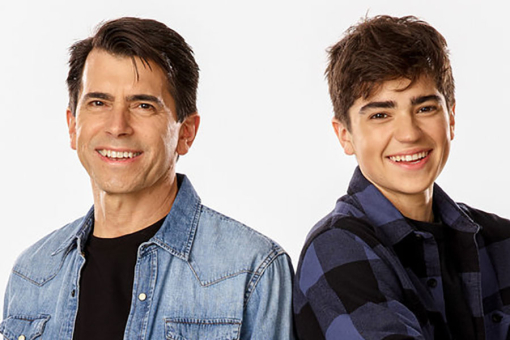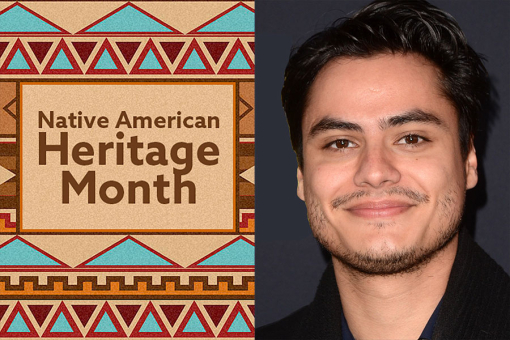Twenty-three years ago, Chris Eyre (Cheyenne, Arapahoe) never dreamt his breakout film Smoke Signals would have a lasting impact.
Yet in 2018, it was inducted into the National Film Registry of the Library of Congress because of its cultural and historic importance. Also that year, director Martin Scorsese named it as one of his 38 essential films about America.
"It's lived on as a statement," Eyre says during a phone call from his home in Santa Fe, where he's lived for a decade. "For the Native community, it's an anthem, a lighthearted look at these two young men in Phoenix in the face of tragedy of one dad's death, yet it is a comedy. The real staying power is the funny, lighthearted, universal scenes of family.
"Every Halloween, I get pictures of kids dressed as Thomas and Victor. Thomas' 'Frybread Power' T-shirts are sold online. It's had a staying power I didn't expect."
Eyre, who is currently working on a television series with Game of Thrones author George R.R. Martin which features two Native characters as the leads, also hints there could be a sequel to Smoke Signals, with some progress being made on a screenplay.
The director's current work is part of a changing landscape that he feels is much more inclusive of Native and Indigenous communities than it has been in the past.
"We're in the middle of massive change," he says. "Ever since 2017's Standing Rock in North Dakota there's been an interest in Hollywood to not have Natives be invisible. There's been much more inclusion, more opportunities and more writers putting Native characters in film and TV.
"We want to evolve to a place where it's not an anomaly to see Natives as protagonists in TV series. African American have done that for years. We're waiting for Wes Studi to be the lead in a TV series, and it's exciting to feel things changing."
Eyre grew up in Oregon where he developed an interest in black-and-white photography. He began studying filmmaking and was accepted into the graduate film school program at NYU in the early 1990s, a time when independent film was exploding.
That helped to create an atmosphere contributing to the success of Smoke Signals later in the decade, which despite Eyre's modesty about the film, was highly acclaimed at the time, including winning both the Sundance Audience Award and its Filmmakers Trophy.
In addition to writing and directing his own projects, Eyre has served as a cultural advisor to several recent motion pictures. Perhaps if such advisors had existed in the past, there wouldn't have been a long history of on-screen racism—particularly in the portrayal of Native Americans in Westerns of the John Wayne ilk.
"I'm for the revisionist Westerns in which you think of Native people in a different light," Eyre says. "In Killers of the Flower Moon, Scorsese made a real effort to portray Osage people accurately and use advisors. There was a ton of research to get it right. I did the same thing for Scott Cooper's Hostiles to bring Cheyenne people in and for Guillermo del Toro's movie Antlers.
"I was the Native American advisor for Comic Con online. It just signals that people are very conscious and treat Native American material respectfully and include Native talent and advisors. That means it is changing in a good way."
He's also encouraged by the multi-generational embrace of racial and ethnic inclusion. "I've been observing Native American millennials joining hands with African Americans and talking about similarities in history," he says. "Generationally they don't see that line as much as generations before them.
"I think Native Americans gravitate toward that understanding. I feel real connectivity with Black Americans. We're 100% justice for George Floyd. Post-George Floyd, Hollywood pays attention and leads the world in directions we need to go in with racial and gender consciousness."
Yet there are cultural chasms that still need to be bridged. "I don't think people think enough of us," Eyre says. "Sometimes we're not included in diversity conversations. We are one of the smallest groups, and it's ironic that we're not included. There are cultural parts of that, too. We need a louder bullhorn.
"The bullhorn is industry, journalists, the studios that allow us to have that voice and greenlight projects with Native talent. We need to be the machine that amplifies that."
Part of that amplification is Eyre's advisory role to Camel Rock Studios, a 25,000 square foot facility developed in a former casino on Tesuque tribal lands overlooking the Sangre de Cristo Mountains outside Santa Fe. The tribe plans to create training programs for Tesuque Pueblo members and hopes the new studio will foster new avenues of storytelling.
"Myself personally, I think we all contribute. Indian Country is about the community, not about Westernized thought that there is one person," he says. "In Native culture, it's much more of a communal thing. We're eclectic, we're enigmatic, we're funny. I love the fact that we're a mosaic of different people with the commonality of being Native. It's one of our greatest strengths."
Read more on Native American inclusion in the television industry.













